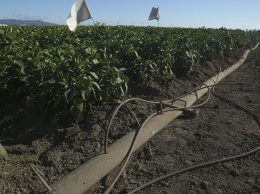Editorial: Paso Robles makes progress on water issue
Gov. Jerry Brown has proved himself to be adept at the use of sharp elbows and brute power to get what he wants.
His water bond is a clear example of the use of power to tame public policy — it paves the way for voters to approve a scaled-down, $7 billion issue that would create new storage projects and shelve, at least for now, the controversial idea of bringing water from the Sacramento Delta to Southern California via huge tunnels.
A separate piece of legislation, awaiting Brown’s signature at press time, paves the way for a solution to North San Luis Obispo County’s chronic groundwater deficits in an area north of Paso Robles.
County supervisors, state legislators and two community groups joined together to support the measure which provides for the formation of a hybrid special district to manage groundwater in North SLO County.
The two groups — Paso Robles Agricultural Alliance for Groundwater Solutions, or PRAAGS, and PRO Water Equity — once fought bitterly for control over who would guide the future oversight of dwindling water supplies in an area that includes a northern portion of the city of Paso Robles and surrounding areas.
AB 2453 would provide for the formation of a hybrid board of directors to oversee a proposed Paso Robles Water District that would allocate groundwater resources. The provision provides for 10 percent of the landowners in the basin to file a petition with the Local Agency Formation Commission to get the process started; final approval of the district requires a vote of 50 percent plus one with each landowner getting one vote.
The district’s nine directors would be split between those elected by voters and those selected by large and small landowners.
There’s a very long way to go between passage of AB 2453 and the actual implementation of a groundwater oversight plan for North SLO County. But some of the hardest work — getting the parties to the table and getting a framework for going forward — has now been done.











